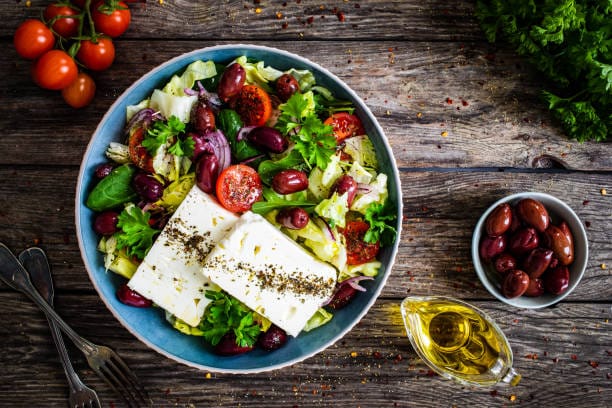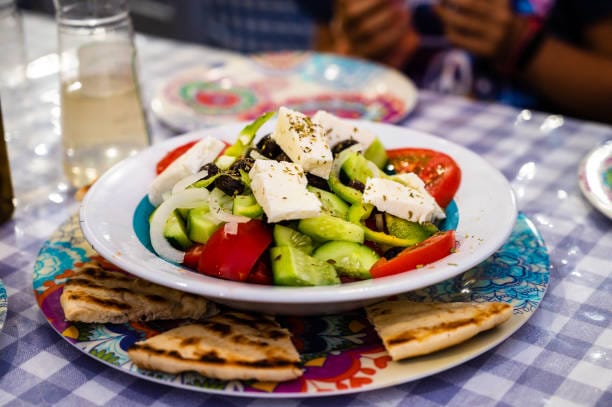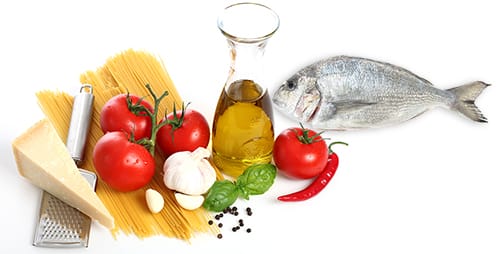MEDITERREAN DIET EAT LIKE A GREEK



There are few diets as universally recommended by experts as the Mediterranean diet. That’s because it’s not really a diet at all — it’s a lifestyle, says Elena Paravantes-Hargitt, a registered dietitian-nutritionist who specializes in the Mediterranean diet and is the founder of Olive Tomato. Paravantes-Hargitt lives in Greece. “It is based on the way people in certain parts of the Mediterranean were living and eating, so it is quite sustainable and realistic,” she says.
What Is the Mediterranean Diet Exactly?
The Mediterranean diet is a mostly plant-based diet. Paravantes-Hargitt says, “It’s essentially a peasant diet. People would eat whatever they had growing in their gardens, along with some dairy, fish, olive oil and ocassional meat.”
For a handy visual look at the Mediterranean diet of today, Paravantes-Hargitt recommends checking out Oldways, an organization, along with the Harvard T.H. Chan School of Public Health and the World Health Organization, that created the Mediterranean diet pyramid 25 years ago.
Atop exercise stand the core foods: whole grains, fruits, vegetables, beans, herbs, spices, nuts, and olive oil. The groups recommend eating fish and seafood twice a week and moderate amounts of dairy, eggs, and poultry. Red meat and sweets are consumed just sometimes.
What Are the Benefits and Risks of the Mediterranean Diet?
If you’re on the fence about eating more Mediterranean, consider all the research that backs it up. A study and meta-analysis found that every point increase in Mediterranean diet score — meaning how well one follows the eating style on a scale of 1 to 9 — was associated with a 5 percent lower risk of death from any cause.
It’s also tough to look past these numbers when it comes to your ticker. In a study of nearly 26,000 women, those with the highest adherence to the Mediterranean diet were up to 28 percent less likely to develop heart disease.

The diet may be particularly protective because it can reduce inflammation. Plus, the antioxidant compound called hydroxytyrosol, found in foods that are hallmarks of the diet (fruits, nuts, extra-virgin olive oil), has been shown to repair heart-harming free radical damage, the authors say.While living longer and taking care of your heart are important to you, there’s no denying that you may be interested in the Mediterranean diet for its weight loss potential. Although not a main goal of this eating approach, it may help stabilize your weight — without making you feel deprived.
A study by researchers at Harvard University and Emory University followed a group of overweight or obese adults on the Mediterranean diet and a control group eating a standard American diet supplemented with fish oil, walnuts, and grape juice — foods that supply key nutrients in the Mediterranean diet.
A standard American diet is rich in foods that are high in saturated fat, added sugar, and salt. Compared with the control group, Mediterranean diet followers lost more weight, reduced their blood levels of inflammatory markers, and lowered their total cholesterol and LDL (“bad”) cholesterol. The bonus: It wasn’t supposed to be a weight loss study to begin with (that was just a nice bonus) so both groups ate a similar number of calories.As for risks, dietitians often recommend a Mediterranean-style diet to those managing chronic diseases such as type 2 diabetes. While this diet is considered heart-healthy, the American Heart Association does point out that it contains more fat than is typically recommended (though it’s still low in unhealthy saturated fat).
The main takeaway: This is one of the healthiest ways you can eat, but like everything else, if you’re changing your diet or using a diet in your treatment plan for a disease, always talk to your doctor first.

5 Tips for Creating Your Mediterranean Diet Plan
The good news is that because this is a style of eating versus a set of rigid rules, you can fully customize this approach to suit your likes and dislikes. There’s no following this to a T or falling off the wagon and feeling like a failure. “Even within the Mediterranean diet there are what we call ‘special occasion days’ where you may eat more or eat foods that perhaps are not very healthy, but that is actually part of the lifestyle,” Paravantes-Hargitt says. “Food is to be enjoyed, and the Mediterranean diet promotes a healthy relationship with food. ‘Cheating’ is part of the Mediterranean diet. You just continue the next day as if nothing happened.”
Still, here are five important tips to get you started:
- Eat more legumes. Not only are they a staple that you’re probably not eating enough of anyway but they’re budget-friendly and offer a host of nutritional benefits, says Paravantes-Hargitt, such as being high in fiber and protein, low in fat, and a source of B vitamins, iron, and antioxidants. These include lentils, dried peas, beans, and chickpeas (like hummus).
- Don’t overdo alcohol. One common misunderstanding is that those following the Mediterranean diet drink a lot of red wine. “The wine consumed within the Mediterranean diet is done in moderation and is always consumed with food,” Paravantes-Hargitt says. “Usually a small amount of wine, about 3 to 4 ounces, would be consumed with the meal.”
- Make meat a side. Traditionally, people ate meat only for special occasions, such as a Sunday supper, and even then in small amounts, says Paravantes-Hargitt. Try to incorporate more vegetarian-based mains, such as those centered around beans, tofu, or seitan, into your day. “A good place to start is going vegetarian one day a week,” she says. When you do eat meat, focus on choices like skinless chicken and save red meat for once a week or twice a month.
- Eat fewer sweets. Just like meat, make desserts a special occasion dish. That doesn’t mean sugar is out — have a bit in your coffee if you’d like, for instance, “but on a daily basis, there isn’t much sugar eaten,” says Paravantes-Hargitt.
- Cook with olive oil. Make extra-virgin olive oil the oil you cook with. While overdoing it with this oil can lead to weight gain (it’s a fat after all, so the calories can add up quickly), it’s rich in heart-healthy polyunsaturated and monounsaturated fat, so you can feel good about keeping a bottle handy in the kitchen. You can also use it in cold applications to make salad dressing or to drizzle on cooked veggies or side dishes.

Your 7-Day Mediterranean Diet Eating Plan
Want to start eating like a Greek? Here are some ideas about where to start when planning your menu. Note that we don’t give portion sizes. This is one diet in which calorie counting is not expected. What your body needs will be different from the next person.
It's quite easy to move toward a more Mediterranean-style of eating — that will fit with your lifestyle.
Day 1
Breakfast Coffee or tea with a bowl of oatmeal topped with berries
Snack Handful of almonds or walnuts
Lunch Half of a turkey sandwich made with whole-grain bread and a cup of lentil soup
Snack Sliced carrots, bell peppers, and cucumbers dipped in hummus
Dinner Veggie and white bean stew
Day 2
Breakfast Coffee or tea with plain Greek yogurt topped with a drizzle of honey and walnuts
Snack Roasted chickpeas
Lunch Leftover veggie and bean stew from yesterday's dinner
Snack A peach (or apple, depending on the season)
Dinner Roasted chicken served with pita bread, tzatziki (a yogurt-based sauce), and a side salad
Day 3
Breakfast Smoothie made with the milk of your choice, fruit, and nut butter
Snack ¼ avocado mashed with lemon juice and salt on top of whole-grain crackers
Lunch Three-bean soup topped with a dollop of pesto and served with a whole-grain roll
Snack Package of olives and fresh veggies
Dinner Salmon with farro and roasted zucchini and eggplant
Day 4
Breakfast Coffee or tea and toasted whole-grain bread, sliced cheese, and strawberries
Snack Pistachios
Lunch Lentil-based salad with feta, roasted red peppers, sun-dried tomatoes, and olives
Snack Greek yogurt with fresh fruit
Dinner Grilled shrimp served with sautéed kale and polenta
Day 5
Breakfast Coffee or tea and a breakfast bowl of leftover farro (from dinner on day 3) topped with a poached egg and a few slices of avocado
Snack Dried apricots and walnuts
Lunch Quinoa, bean, and veggie salad served with a slice of whole-grain bread
Snack Whole-grain crackers and black bean dip
Dinner Marinated, grilled chicken skewers served with bulgur wheat and a cucumber and red onion salad
Day 6
Breakfast Coffee or tea and smoked salmon, capers, and tomato slices
Snack In-season fruit (such as a peach or two apricots in summer, or a pear in winter)
Lunch Mediterranean bean salad and whole-grain crackers
Snack Piece of cheese and olives
Dinner Moroccan lamb stew with couscous
Day 7
Breakfast Coffee or tea and Greek yogurt with sunflower seeds and raspberries
Snack Sliced orange and pistachios
Lunch A piece of whole-grain bread with sliced tomatoes, cheese, and olives
Snack Packaged, flavored lupini beans
Dinner Red lentil and vegetable stew

THINGS YOU MAY NOT KNOW: The Mediterranean diet includes a high proportion of olive oil, beans, unrefined cereals, fruits and vegetables, moderate to high levels of fish, moderate levels of dairy products (mostly cheese and yogurt) and wine, and low consumption of meat and meat products.
THINGS YOU MAY WANT TO SAVE: AUNT MILLIES PICKELED PIGS FEET
ZENTRAVLER SAYS: IT'S ALL IN WHAT YOU EAT. LIKE TO ADD A FEW YEARS OF LIFE...ADOPT THE MEDITERREAN EATING AND LIFE STYLE
From here to Infinity is a relatively short ride! The next leg takes eons and eons as you fly through the Barycentric Dynamical Time Zone! …and on and on and on. Follow the Zentraveler Newsletter often for Travel, Health and Zen-like stories and such. Where else can you get a THREE IN ONE NEWSLETTER FOR THE PRICE OF FREE.

ZENTRAVELER IS A PERSONAL NEWSLETTER, DESIGNED TO GIVE TRAVEL, HEALTH, WRITING AND HUMOR INCLUDING HELPFUL HINTS WITH A ZEN LIKE QUALITY.
PLEASE CHECKOUT MY NEW VIDEO PODCASTS AT ZENTRAVELER ON YOUTUBE...THANKS
